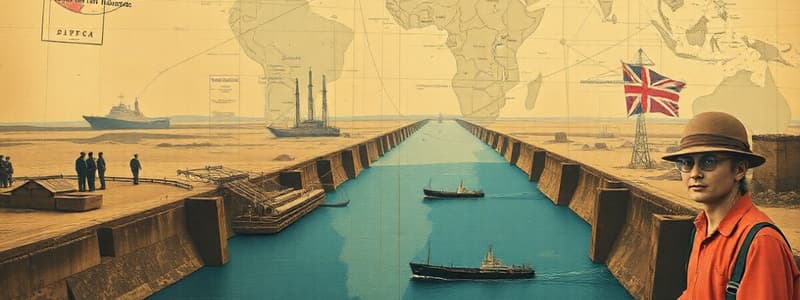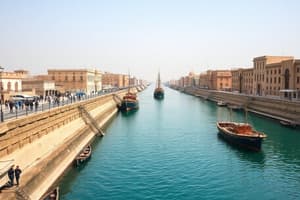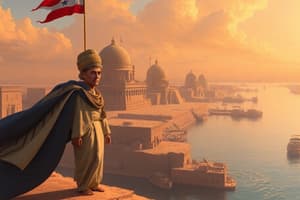Podcast
Questions and Answers
What was one significant advantage of constructing the Suez Canal?
What was one significant advantage of constructing the Suez Canal?
- It greatly shortened the sea route to Asia. (correct)
- It eliminated the need for steamships.
- It increased trade with North America.
- It provided a third option for land travel to Asia.
Who primarily performed the labor for the construction of the Suez Canal?
Who primarily performed the labor for the construction of the Suez Canal?
- Volunteers from Europe.
- Employed Egyptian workers with fair wages.
- Skilled laborers from North Africa.
- Corvée laborers who were unpaid and forced to work. (correct)
What event prompted Britain to seize control of Egypt in 1882?
What event prompted Britain to seize control of Egypt in 1882?
- Unrest threatening British commercial interests. (correct)
- An alliance with the Ottoman Empire.
- A treaty dispute with France.
- Economic gains from British businesses.
Which colony was established by Britain as a home for freed enslaved people?
Which colony was established by Britain as a home for freed enslaved people?
What strategy did Britain use to expand its empire in West Africa?
What strategy did Britain use to expand its empire in West Africa?
What was a consequence of the increasing European competition for African lands?
What was a consequence of the increasing European competition for African lands?
Which country drove the Ottomans out of Algeria?
Which country drove the Ottomans out of Algeria?
What was created in Algeria by 1870 as part of colonial development?
What was created in Algeria by 1870 as part of colonial development?
What significant historical event occurred in Argentina in 1816?
What significant historical event occurred in Argentina in 1816?
What was one of the main reasons for the Berlin Conference in 1884-1885?
What was one of the main reasons for the Berlin Conference in 1884-1885?
How did imperialism in East Asia differ from imperialism in Africa during the period 1750–1900?
How did imperialism in East Asia differ from imperialism in Africa during the period 1750–1900?
What major conflict arose from the competition between the British and Afrikaners in southern Africa?
What major conflict arose from the competition between the British and Afrikaners in southern Africa?
What was one reason imperialism in state-run colonies was similar to that in settler colonies during the period 1750–1900?
What was one reason imperialism in state-run colonies was similar to that in settler colonies during the period 1750–1900?
Which of the following best describes the impact of the colonial borders established by European powers in Africa?
Which of the following best describes the impact of the colonial borders established by European powers in Africa?
What was one potential motivation for President Monroe to issue his doctrine regarding Latin American countries?
What was one potential motivation for President Monroe to issue his doctrine regarding Latin American countries?
Which of the following accurately reflects a major consequence of the shift in state power between 1750 and 1900?
Which of the following accurately reflects a major consequence of the shift in state power between 1750 and 1900?
Which river was recognized for free movement of goods during the Berlin Conference?
Which river was recognized for free movement of goods during the Berlin Conference?
During the Boer Wars, what term was used to describe the settlements where Afrikaner refugees were held?
During the Boer Wars, what term was used to describe the settlements where Afrikaner refugees were held?
In the 1870s, which European country established trading posts in West Africa to compete with British colonies?
In the 1870s, which European country established trading posts in West Africa to compete with British colonies?
What encouraged the European nations to engage in the 'Scramble for Africa'?
What encouraged the European nations to engage in the 'Scramble for Africa'?
What was the main consequence of the poor conditions in refugee camps during the Boer Wars?
What was the main consequence of the poor conditions in refugee camps during the Boer Wars?
What is a primary characteristic of settler colonies?
What is a primary characteristic of settler colonies?
What was a significant consequence of imperialist expansion in colonized regions?
What was a significant consequence of imperialist expansion in colonized regions?
How did economic domination typically manifest in colonial territories?
How did economic domination typically manifest in colonial territories?
What effect did settler colonies often have on indigenous populations?
What effect did settler colonies often have on indigenous populations?
What was one outcome of British colonization in China?
What was one outcome of British colonization in China?
What was a typical characteristic of imperialist rule?
What was a typical characteristic of imperialist rule?
Which of the following was a tactic employed by imperialist countries to maintain control?
Which of the following was a tactic employed by imperialist countries to maintain control?
What was a significant action taken by Empress Catherine II during her reign?
What was a significant action taken by Empress Catherine II during her reign?
What was the primary reason for the British East India Company's expansion into the Mughal Empire?
What was the primary reason for the British East India Company's expansion into the Mughal Empire?
Which event led to the French loss of influence in India?
Which event led to the French loss of influence in India?
What nickname was given to native Indian soldiers serving in the British colonial army?
What nickname was given to native Indian soldiers serving in the British colonial army?
What internal conflict significantly weakened the Qing government, facilitating European dominance in China?
What internal conflict significantly weakened the Qing government, facilitating European dominance in China?
Which of the following factors contributed to famine during the Taiping Rebellion?
Which of the following factors contributed to famine during the Taiping Rebellion?
How did European nations interact with China during the period of imperialism?
How did European nations interact with China during the period of imperialism?
What was one consequence of the Qing government's internal issues during the Taiping Rebellion?
What was one consequence of the Qing government's internal issues during the Taiping Rebellion?
Which area did Britain ultimately control in India by the end of its imperial expansion?
Which area did Britain ultimately control in India by the end of its imperial expansion?
What was the primary purpose of the Monroe Doctrine as expressed in the passage?
What was the primary purpose of the Monroe Doctrine as expressed in the passage?
According to the passage, how would the United States view European intervention in independent nations?
According to the passage, how would the United States view European intervention in independent nations?
What event exemplifies the U.S. leaders' potential interest in economic imperialism related to the Monroe Doctrine?
What event exemplifies the U.S. leaders' potential interest in economic imperialism related to the Monroe Doctrine?
Which of the following actions was taken by the United States post-Monroe Doctrine to assert its imperial ambitions?
Which of the following actions was taken by the United States post-Monroe Doctrine to assert its imperial ambitions?
Which implication can be drawn from the phrase 'unfriendly disposition' in the context of the passage?
Which implication can be drawn from the phrase 'unfriendly disposition' in the context of the passage?
What does the passage suggest about the United States' relationship with existing European colonies?
What does the passage suggest about the United States' relationship with existing European colonies?
How did the Monroe Doctrine reflect the attitude of the United States towards European powers?
How did the Monroe Doctrine reflect the attitude of the United States towards European powers?
Which historical context is most closely associated with the attitudes expressed in the passage?
Which historical context is most closely associated with the attitudes expressed in the passage?
Flashcards
Suez Canal
Suez Canal
A 100-mile-long canal connecting the Red Sea with the Mediterranean Sea, completed in 1869, dramatically shortening the route to Asia.
Corvée Laborers
Corvée Laborers
Forced laborers, unpaid workers who were compelled to work on projects as a form of taxation, often under harsh conditions.
Seizure
Seizure
The act of taking control of a country or region by force, often through military intervention.
Settler Colony
Settler Colony
Signup and view all the flashcards
Scramble for Africa
Scramble for Africa
Signup and view all the flashcards
Treaties with African rulers
Treaties with African rulers
Signup and view all the flashcards
Resistance to European Control
Resistance to European Control
Signup and view all the flashcards
Overpowering Military Strength
Overpowering Military Strength
Signup and view all the flashcards
British Expansion in India
British Expansion in India
Signup and view all the flashcards
Sepoys
Sepoys
Signup and view all the flashcards
Seven Years' War (1756-1763)
Seven Years' War (1756-1763)
Signup and view all the flashcards
Spheres of Influence in China
Spheres of Influence in China
Signup and view all the flashcards
Taiping Rebellion
Taiping Rebellion
Signup and view all the flashcards
Natural Disasters during Taiping Rebellion
Natural Disasters during Taiping Rebellion
Signup and view all the flashcards
China's Unique Imperialism
China's Unique Imperialism
Signup and view all the flashcards
EIC's Use of Sepoys
EIC's Use of Sepoys
Signup and view all the flashcards
Berlin Conference
Berlin Conference
Signup and view all the flashcards
Afrikaners
Afrikaners
Signup and view all the flashcards
Boer Wars
Boer Wars
Signup and view all the flashcards
Concentration Camps
Concentration Camps
Signup and view all the flashcards
Colonial Borders
Colonial Borders
Signup and view all the flashcards
Forced Labor
Forced Labor
Signup and view all the flashcards
Loss of African Sovereignty
Loss of African Sovereignty
Signup and view all the flashcards
What was the Monroe Doctrine?
What was the Monroe Doctrine?
Signup and view all the flashcards
What did the Monroe Doctrine specify about existing European colonies?
What did the Monroe Doctrine specify about existing European colonies?
Signup and view all the flashcards
What was the underlying goal of the Monroe Doctrine?
What was the underlying goal of the Monroe Doctrine?
Signup and view all the flashcards
How did the Spanish-American War demonstrate US imperialism?
How did the Spanish-American War demonstrate US imperialism?
Signup and view all the flashcards
Why are caricatures used in the cartoon?
Why are caricatures used in the cartoon?
Signup and view all the flashcards
Economic Domination
Economic Domination
Signup and view all the flashcards
Russian Expansion under Catherine II
Russian Expansion under Catherine II
Signup and view all the flashcards
Imperial Control
Imperial Control
Signup and view all the flashcards
British West Africa
British West Africa
Signup and view all the flashcards
Belgian Congo
Belgian Congo
Signup and view all the flashcards
French Algeria
French Algeria
Signup and view all the flashcards
What was the Monroe Doctrine and what were its goals?
What was the Monroe Doctrine and what were its goals?
Signup and view all the flashcards
Why did President Monroe issue the Monroe Doctrine?
Why did President Monroe issue the Monroe Doctrine?
Signup and view all the flashcards
How did state power shift globally between 1750-1900?
How did state power shift globally between 1750-1900?
Signup and view all the flashcards
What historical development is represented in the cartoon?
What historical development is represented in the cartoon?
Signup and view all the flashcards
Why was China unable to withstand European imperialism?
Why was China unable to withstand European imperialism?
Signup and view all the flashcards
Study Notes
State Expansion
- Various processes led to shifts in state power between 1750 and 1900
- King Leopold II of Belgium aimed to conquer the Congo Basin, but the Belgian government revoked his private control in 1908 due to abuses.
- Similarly, the Dutch government revoked the charter of the Dutch East India Company for abuses of power in Southeast Asia.
- Other European powers, as well as the US, Russia, and Japan, expanded through conquest and settlement.
Imperialism in Africa
- Europe had a long-standing relationship with Africa due to the slave trade.
- Importation of Africans as slaves was illegal by the early 1800s, but Europeans still exported guns, alcohol, and manufactured goods.
- European demand for African natural resources (palm oil, gold, ivory) drove trade.
- Industrialization in England led to increased demand for specific African resources.
- European presence was mostly limited to trading posts, with exceptions.
- French seizure of Algeria in 1830
- Dutch immigrants settling in South Africa since the 1600s, and British colonists' arrival in the early 1800s. European presence increased in Africa.
British Control of Egypt
- Europeans desired a canal connecting the Red Sea and the Mediterranean Sea.
- The Suez Canal was completed in 1869, significantly shortening the sea route to Asia.
- Much of the labor was done by Egyptian workers, many of whom were corvée laborers.
- Britain seized control of Egypt in 1882, due to regional unrest threatening British commercial interests.
British West Africa
- Britain established various colonies in West Africa before the mid-19th century.
- Sierra Leone, established in 1787, was a refuge for freed enslaved people.
- Gambia, established by 1816, and later Lagos (1861) served as bases for preventing the export of enslaved people.
- Parts of modern-day Ghana were gradually acquired starting in 1874, and the Asante Empire in 1901.
- Britain used a mix of diplomacy and warfare to conquer and control.
The European Scramble for Africa
- Tensions arose among European nations due to competition for African resources.
- The Berlin Conference (1884-1885), a meeting of European powers, established colonial boundaries to avoid conflict.
- European colonizers established borders with no regard for already established African societies and groups.
- South Africa saw conflict between British and Afrikaners.
The Boer Wars
- Boer Wars (1880-1881 and 1899-1902) involved bloody conflicts and use of concentration camps for the Afrikaners.
- Concentration camps were criticized for severe conditions and loss of life.
Congo
- King Leopold II personally owned the Congo Free State.
- Exploitation of Congolese laborers was common, including severing limbs as punishment for failing to meet quotas for the production of rubber and ivory
- Conditions were horrific but conditions improved after the Belgian government took control.
Imperialism in East Asia
- China did not experience direct imperialism like Africa or South Asia.
- China was carved into 'spheres of influence' through economic intrusion.
- Internal conflicts in China, such as the Taiping Rebellion, were exacerbated by foreign powers.
- The Qing dynasty struggled to compete with European powers.
- The Boxer Rebellion (1899-1901) arose as resistance to foreign influence.
Japanese Imperialism
- Japan industrialized and expanded its influence in East Asia.
- Japan established colonies by establishing trading ports with other nations
- Japan's motives and actions were to obtain resources
- Japan's expansion had a significant impact on the region.
Imperialism in Southeast Asia
- Portugal and Spain initially dominated trade, but by the 17th century, the Dutch and British had overtaken them.
- Dutch East India Company (VOC) controlled areas in Southeast Asia.
- British influence grew through trading posts, as well as military and political influence.
- Siam, modern-day Thailand, successfully avoided full-scale colonial takeover, though it faced pressure to cede territory.
- Europeans were looking for natural resources.
Australia and New Zealand
- British colonization of Australia began with convict settlements, moving later to free settlements.
- Discovery of resources like wool and copper spurred further settlement.
- New Zealand was annexed into British control (1839) and was treated as a separate colony but was influenced greatly by the Australian colonies.
U.S. Imperialism
- The U.S. sought land and dominance in the Pacific as well as in Latin America.
- The Monroe Doctrine (1823) proclaimed that the Americas were off-limits to further European colonization.
- The Spanish-American War (1898) led to U.S. control of territories in the Caribbean and Pacific.
- Social Darwinism in the US fueled the belief that the United States had a mandate to expand its influence.
Comparison of Imperialism
- State-Run Colonies involved European institutions replacing local culture and often justified as "helping" the local population.
- Settler colonies saw European settlers dominating indigenous populations and sometimes removing them.
- Economic domination saw European countries exploit local resources while preserving the indigenous local government (though it increasingly weakened).
Russian Expansion
- Catherine II's expansion of the Russian Empire involved annexing territory in Poland, the Ottoman Empire etc.
- Early 19th century Russian merchants explored and established outposts in North America, eventually selling Alaska to the US.
Studying That Suits You
Use AI to generate personalized quizzes and flashcards to suit your learning preferences.




